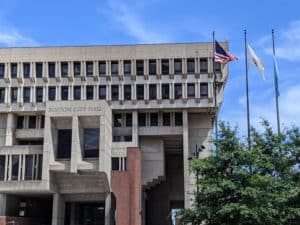A coalition of real estate and business groups suffered a setback Wednesday in their campaign to keep Boston leaders from increasing their property tax rate to deal with a large, expected budget shortfall.
By an 8-4 vote the Boston City Council approved a proposal from Mayor Michelle Wu to temporarily shift more of the city’s property tax burden from residential properties like houses and apartment buildings and onto commercial properties. The measure must first be approved by state legislators before July 31 if it is to take effect.
Councilor Julia Mejia voted “present” while councilors John FitzGerald, Ed Flynn, Erin Murphy and Brian Worrell, chair of the council’s budget-oversight Ways and Means Committee, voted against the measure. Councilors had grappled with the issue for some weeks, concerned about the consequences of the proposal.
With office property values plummeting, driven by a substantial reduction in the leasing of class B and C space, a study by the Boston Policy Institute and the Tufts University Center for State Policy Analysis estimated the city could see a $500 million decline in property tax receipts by 2029.
Wu and her top financial aides sought the tax rate increase to prevent a sudden spike in residential property tax bills for the next fiscal year and to prevent substantial cuts to city spending, which is set to rise under the mayor’s proposal for next fiscal year thanks to a slew of collective bargaining agreements negotiated in the last year that take into account inflation-driven cost of living increases and a notable swelling of the Boston Public Schools budget.
Under Wu’s proposal, commercial tax rates would spike 17.4 percent to $29.66, while the residential tax rate would decline 7.8 percent to $10.05. The increase could cause a $2.6 million drop in commercial property values by biting into the income they generate for their owners and investors, according to a report by tax consultancy Ryan.
Business leaders say the tax proposal will drive investment into the city’s suburbs, add extra costs for retailers – a number of whom must also pay property taxes via triple-net leases – and substantially harm efforts to revitalize downtown without addressing the long-term problem of declining office values in an era of hybrid and remote work. Neighborhood groups and affordable housing advocates say not passing the measure will push rents up as multifamily landlords pass the increased costs on to renters, could force some low-income senior homeowners to sell and would make it much harder for first-time homebuyers to afford property.
“Increasing taxes on commercial properties, an industry that has long fueled Boston’s budget, and an industry facing existential challenges, is incredibly misguided, fiscally short-sighted, and ultimately will be proven to be economically problematic. Instead of increasing the commercial property tax rate, city and state leaders must focus on boosting the region’s competitiveness and attracting businesses. We urge officials on Beacon Hill to reject this deeply flawed policy and focus on reforms that do not punish any one industry,” Greater Boston Real Estate Board CEO Greg Vasil said in a statement.







